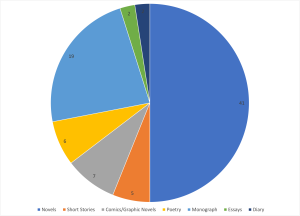As I write this, I am listening to Leonard Cohen’s new album, which somehow seems appropriate. But the inspiration for this was something quite different: the (mostly online, highly specialized) argument about Lana Del Rey. I am definitely not going to get into all the details of this argument– frankly, I’m not that familiar with them, because I don’t care very much. The gist of it (well summarized and dismissed here) is that Lana Del Rey is not her real name (she is Lizzie Grant), she used to have a different look and sound, and she is from a wealthy background. In the eyes of some, these facts essentially disqualify her and her music from consideration; the argument, such as it is, is that she is not “authentic.”
Many people have questioned the idea of authenticity in music, pointing out both that being a performer is, well, a performance, and as such necessarily involves a self-presentation that is, in some degree, selective. I would also not be the first to argue that it is the output, not to context, that matters– in other words, that we should ask only whether what we are hearing is a good song, not whether the way in which the artist presents him- or herself meets some criteria for being “genuine.” I generally agree with both of those arguments, but what I want to address is the double standard faced by musicians who can broadly be classified as “popular.”
If a writer publishes a novel in which, say, the narrator is a serial rapist, and we as the audience are given some level of insight into his actions through his narration, we do not (or should not) therefore conclude that the author condones rape. In novels, we take characters as characters. They may be likable or unlikable, sympathetic or unsympathetic, believable or not, but i any case we take it for granted that they are fictional creations. We can interrogate the author’s reasons for creating a particular kind of character, or ask whether a character and his or her development successfully does the work that the author intends them to– that is, whether they are a successful vehicle for whatever it is we think the author is trying to convey. But we certainly do not take it for granted that every character is autobiographical. If we did, we would seriously limit the expressive range of writers, and undermine the whole idea of “fiction” as a possibility. If nothing else, we would certainly lose genres like science fiction and fantasy.
Of course, we have different standards for memoir and its associated forms, as the scandal over James Frey and any number of other falsified memoirs demonstrates. But these works explicitly claim to describe events which actually occurred in the life of the author, and the value of the work lies precisely in this. We read memoir to understand how a real, actually existing human being dealt with some set of circumstances, with the idea that their example will tell us something about ourselves and our lives (or at least be interesting). The lack of “authenticity” in this case therefore directly undermines the purpose of the work, in a way that simply does not apply to a novel.
Much, maybe most, popular music makes no such explicit claim to autobiography, and yet that is the standard to which it is held. This standard is applied from many different angles. Fans are disappointed to find out that certain artists are not, in everyday life, much like their public personas. But critics of the lyrical content of pop also make similar kinds of assumptions. The hysteria over Marilyn Manson demonstrated that his critics took what he said very seriously, assuming that he actually did in fact worship satan, sacrifice animals (and possibly human beings), drink blood, and debauch himself in any number of other ways. The idea that it might all be an act— and that this might be the point, not a sign of being inauthentic or “fake”– apparently occurred to remarkably few people, despite the fact the he said as much himself any number of times.
There are, of course, artists who trade on authenticity, particularly in rap. If we were to discover that, say, 50 Cent in fact grew up in a middle class suburb, went to good schools, and got those scars in a tragic accident on a Boy Scout camping trip, that would indeed detract from his credibility, and undermine at least one of the reasons that people enjoy his music. But not because all artists should be held to that standard; because he explicitly and repeatedly asserts that his music is a direct and honest representation of his real life. Authenticity here serves the same purpose as in memoir: it is central to the artistic claims of the work.
Of course, one can still argue that James Frey’s memoir was a good read, or that a 50 Cent song would still work in the club if his authenticity were questionable. But my point is that while we distinguish pretty clearly between memoir and fiction, and apply different standards to each, we tend to apply the authenticity standard to popular music in a blanket way. Hence Lana Del Rey. Her lyrics are, in general, pretty non-specific, unremarkable stuff, so it would be hard to meaningfully demand that they “really” represent her life and experience. Instead, she is attacked as a personality, as someone who is, in essence, ineligible for genuine artistic expression because she is not who she claims to be. She is “fake,” so her music has to be “fake” in some sense as well.
In novels, the ability to go outside of personal experience– even to go outside of possible personal experience, to transcend the physical or logical rules of the world as we know it– is central to the expressive potential of the work. We care about believability or plausibility, but that is something else; these have to do with the quality of storytelling, not the consistency between the story and the author’s own life. It is a largely internal criterion. We take it for granted that novelists have a free hand to represent things as other than they are, and we judge their work in terms of how well those representations convey some idea or sensibility to the reader. Their relationship to the real world is, if not irrelevant; indirect; they are supposed to be saying something, in some sense, about the world, but they don’t have to do it in a literal way.
But we want to read music in precisely this literal way. We allow for imagery, metaphor, and misdirection in lyrics, but they are still supposed to express something about the artist in a direct, verifiable way: so-and-so sings about darkness and death because they are a sad depressed person, and if we discover that they are in fact happy and well-adjusted we feel cheated. The underlying assumption is that such expressions are somehow less valid if they are not connected to real experience– not in general, but of the particular artist in question.
So why not give artists who make, broadly speaking, “popular” music the same leeway we give novelists? Why not allow them to freely create characters who, we know from the outset, may have little if anything to do with them as a person, or with their personal experiences? Why not allow for the possibility that the person we see on stage might him/herself be a character? This would do no more than give them the same range of creative possibilities open to writers of fiction. For some reason that I haven’t figured out yet, we more or less automatically apply a different, more romantic standard to singers and songwriters (not to mention singer-songwriters), all of whose songs must, in some sense, be about themselves.
Again, there are some cases where this standard makes sense, some artists whose work essentially demands that the standard of authenticity be applied to them. But when it comes to writing we make a distinction between cases where that standard makes sense (memoir, autobiography, maybe the personal essay) and those where it doesn’t (novels, plays, stories). Similarly, there is some popular music that we should treat like a novel, and some we should (maybe) treat like a memoir. I would argue, in fact, that the criteria by which we judge novels (believability, effect, beauty of expression) make more sense as a default standard for music. In other words, we should not apply the standard of authenticity to artists unless and until they themselves make a claim that seems to warrant it.
This might, in the end, effectively bring us to the same place as the argument that we should focus on the output rather than the context– i.e., is it a good song. But I don’t mean to say that context, biography, etc. never matter, or that every song can always be readily divorced from its origins. I am saying that we should not automatically take these concerns into consideration as primary and overriding ones; the standard of authenticity should not be the only one we have for thinking and talking about popular music.
Of course, I am also simplifying the variety of responses to popular music that exist. There are plenty of people, critics in particular, who do recognize that different standards are a better fit for different kinds of work. But I think the Lana Del Rey controversy (such as it is) shows how readily the standard of authenticity can be invoked, and how much it still resonates. Why do we care about the authenticity of this artist, specifically? There is no answer, except that we care in general about authenticity, and so it seems that it should be applicable in this case. My point is that this should not be automatic, and that perhaps Lana Del Rey (whatever her faults or talents) should be thought of as a novelist more than a memoirist, unless and until she makes some kind of claim or presentation about what she does that demands we do otherwise.


